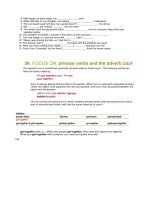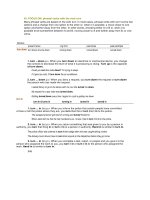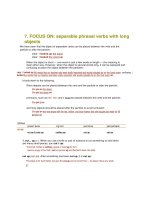two-word phrasal verbs with the particle in that require into when used with an object
Bạn đang xem bản rút gọn của tài liệu. Xem và tải ngay bản đầy đủ của tài liệu tại đây (135.54 KB, 17 trang )
13. My son is a good boy. If he was shoplifting, I'm sure someone ________ him
________________it.
14. In my history class we studied the various things that ________ ________ ________ the current
situation.
15. The month we spent in Italy was a lot of fun, but it seemed to ________ _______ so quickly.
16. My brother-in-law is so sneaky. He tried to ________ me ________ telling him the combination
to my safe.
41. FOCUS ON: two-word phrasal verbs with the particle in that require into when used
with an object
We have seen in Sections 9 and 23 that some two-word phrasal verbs require a second particle
when they are transitive, which makes them three-word phrasal verbs. Many phrasal verbs with
the particle in have a meaning that relates to entering or penetrating. When what is being entered
or penetrated is named, these verbs become transitive; however, this is not done by adding a
second particle but by changing in to into. Another way to look at it is to consider intro two
particles, in and to, written as one word:
The thief broke in.
The thieves broke into the jewelry store.
But this is true only for meanings of the phrasal verb that relate to entering or penetrating,
not for all meanings. Some meanings with in have no into version (and are included in this
section), and some meanings with into have no in version (and are not included in this
section). Moreover, sometimes into is optional, and the verb can be used transitively with
either in or into.
We see also in this section that there is often a phrasal verb with an opposite
meaning with in and into corresponding to out and out of:
I sneaked in.
I sneaked out.
I sneaked into the house.
I sneaked out of the house.
314
Infinitive
present tense -ing form past tense past participle
break in
break in & breaks in breaking in broke in broken in
1. break inlinto p.v. When you break in or break into a place, you enter illegally using force or
deception.
A thief broke in and stole my TV.
When I saw the smashed glass in the street, I knew my car had been broken into.
break-in n. A break-in is an illegal entry into a place using force or deception. The police investigated
a break-in at the liquor store.
2. break... in p.v. When you break in a new mechanical device or a car, you use it slowly and
carefully until you are sure it ready for heavier use. When you break in a pair of shoes, you
wear them only occasionally and for a short time until they are comfortable. When you break in
people at a new job, you train and supervise them and give them less than the normal amount
of work until they are ready for something more difficult.
l don't want to wear these boots on the expedition. I haven't broken them in yet.
We're breaking in a new secretary, so things have been a bit confused at our office lately.
broken in part.adj. After you break in a new mechanical device or a car, a pair of
shoes, or people at a new job, they are broken in.
l don't want to wear those shoes to the dance. They're not broken in yet.
check in
check in & checks in checking in checked in checked in
1. check inlinto p.v. When you arrive at a hotel and arrange for a room, you check in or check
into the hotel.
After I arrive in Denver, I'll go straight to my hotel and check in.
Jim checked into the hotel while I called home to check on the kids.
2. check... in p.v. When you arrive at an airport and give your ticket to an agent and receive a
boarding pass, you check in.
You should check in at least two hours be fore your flight.
You can wait over there in the lobby while I check you in.
check-in n. The counter at an airport where you give your ticket to an agent and receive a
boarding pass is the check-in or the check-in counter. The process of checking in is check-
in.
Before your flight you have to go to the check-in counter.
3. check... in p.v. When you give your luggage to an airline agent so that it will be carried in the
baggage compartment rather than the passenger compartment, you check it in.
315
That bag is too big for carry-on — you'll have to check it in.
checked in part.adj. Luggage that has been checked in or passengers that have checked in
are checked in.
Now that we're checked in, we can wait in the boarding lounge.
4. check in (with) p.v. When you visit or call people briefly and regularly because you want to
get or receive important information from them or to make sure that a situation you are both
interested in is satisfactory, you check in or check in with them.
After surgery, you'll need to check in once in a while to make sure the bone is healing properly.
If Hank doesn't check in with his parole officer every week, the police will arrest him.
Infinitive
present tense -ing form past tense past participle
Check out
check out & checks out checking out checked out checked out
1. check out (of) p.v. When you pay your bill, return your key, and leave a hotel, you check
out or check out of the hotel.
There's always a long line of people waiting to check out at that time of the morning.
Mrs. Gorcia checked out of her hotel and took a taxi to the airport.
checked out part.adj. After you have paid your bill, returned your key, and left a hotel, you are checked
out.
Okay, we're checked out; now let's get a taxi and go to the airport.
checkout n. The time before which you must check out of a hotel in order to avoid paying for
another day is the checkout time.
We can sleep late tomorrow; checkout time isn't until 1:00
P
.
M
.
1. check... out p.v. When you check a place or thing out, you inspect it carefully or learn
more about it.
That new Mexican restaurant is great — you should check it out.
Hey George, check out that car Toad is driving. When did he buy it?
3. check ... out p.v. When you check people out, you investigate them in order to learn more
about them. If you say that people check out, you mean that the information they have given
you about themselves, such as their education and work experience, has been investigated
and found to be accurate.
Applicants for child care jobs should be thoroughly checked out.
Before you give that guy money to invest, you should check him out.
Frank didn't get the job he wanted with the CIA. Some things on his resume didn't check out.
4. check out p.v. When you check out at a store, you bring the items you want to buy to the
cashier and pay for them.
316
The store's closing in a few minutes. We'd better check out.
Look at this line. It's going to take forever to check out.
checkout n. The checkout or the checkout counter is where you pay for items in a
store.
You get the bathroom stuff, I'll get the groceries, and we'll meet at the checkout counter.
Infinitive
present tense -ing form past tense past participle
go in
go in & goes in going in went in gone in
1. go inlinto p.v. When you go in or go into a place, building, room, and so on, you enter it.
It's getting too dark to play tennis. Let's go in.
Frank went into the kitchen to get a cup of coffee.
2. go in p.v. When something goes in or goes into a place, container, enclosure, and so
on, it belongs there, fits there, or can be put there.
That dish goes in the cabinet next to the stove.
All those clothes will never go in this small suitcase.
3. go in p.v. When soldiers enter combat or an area where combat is likely, they go in.
Pull out is the opposite of go in.
The National Guard was ordered to go in and stop the riot.
The marine shouted, "We're going in!" as he jumped from the landing craft.
let in
let in & lets in letting in let in let in
1. let ...inlinto p.v. When you let people or things in or let people or things into a place,
building, room, and so on, you allow them to enter by giving them permission to enter or
by opening a door, gate, and so on.
When the guests arrived, the butler opened the door to let them in.
The guard wouldn't let me into the stadium because I had forgotten my ticket.
2. let... inlinto p.v. When an opening, such as a window, door, hole, crack, and so on,
allows something to enter, it lets it in.
That small window doesn't let in enough light to read by.
The hole in the screen is letting the mosquitoes into the house.
plug in
plug in & plugs in plugging in plugged in plugged in
1. plug ...inlinto p.v. When you connect an electrical device to an electrical outlet, you plug
it in or plug it into the outlet. When you connect any cord or cable to asocket designed to
receive it, you plug it in or plug it into the socket.
317
l plugged my 110-volt TV into a 220-volt outlet and ruined it.
This phone isn't broken; you just forgot to plug the phone cord in.
plugged in part.adj. When an electrical device is connected to an electrical outlet, it is
plugged in.
Be careful with that iron — it's plugged in.
Infinitive
present tense -ing form past tense past participle
sneak in
sneak in & sneaks in sneaking in sneaked in sneaked in
1. sneak inlinto p.v. When you enter a place without anyone seeing or hearing you, you
sneak in or sneak into the place.
When I was a kid I used to sneak into the movie theater through the emergency exit.
If you don't have a ticket for the game, you'll have to sneak in.
sneak out
sneak out & sneaks out sneaking out sneaked out sneaked out
1. sneak out (of) p.v. When you leave a place without anyone seeing or hearing you, you
sneak out or sneak out of the place.
Susie's father told her to stay upstairs in her room, but she sneaked out through the window.
The principal caught me sneaking out of my chemistry class.
EXERCISE 41 a — Complete the sentences with phrasal verbs from this section. Be
sure the phrasal verbs are in the correct tense.
1. Close the door! You're ________ the bugs ________.
2. One of the students _______ _______ and stole the answers for the final exam.
3. My grandfather always ________ ________ a new car by not driving it over 50 miles per hour until
it had gone 1,000 miles.
4. Mark told me he bought a large-screen TV. Let's go to his house and ______ it ______.
5. My laptop computer is in this bag, so I think it would be better to keep it with me on the flight than
to ________ it ________.
6. These speakers ________________ sockets in the back of the stereo.
7. Are you sure this is the right key for this lock? It won't ________ ________.
8. When I'm away on a business trip, I always ________ ________ with my office every morning.
318
9. I was late for class, so I waited until the teacher wasn't looking and _______ _______.
10. The soldiers were ordered to ______________ and capture the enemy position.
11.1 don't trust that guy my daughter wants to marry. I'm going to ________ him _______.
12. Dinner is being served. Let's________________the dining room.
13. There's a crack in the basement wall that's ________ ________ water.
14. At the supermarket you can ________ ________ in the express line only if you have fewer than 15
items.
15. We'll ________ ________ the Grand Hotel on Wednesday.
16. After a week at the hotel, we'll ________ ________ and go home.
17. Any burglar who tries to ________ ________ my house is going to get a big surprise — I've got three
big dogs that aren't very friendly.
18. I ________ ________ only 15 minutes before my flight time, and I almost missed the plane.
EXERCISE 41 b — Write answers to the questions using phrasal verbs, participle
adjectives, and nouns from this section. Be sure the phrasal verbs are in the correct
tense.
1. Janice entered the house quietly so that no one would hear her. What did Janice do?
2. Lydia unlocked the door so that her brother could enter the house. What did Lydia do?
3. Ms. Cummings paid her hotel bill and left. What did Ms. Cummings do?
4. In Question 3, Ms. Cummings had to leave the hotel before noon so that she would not have to pay for
another day. What is noon at the hotel?
5. The window of Nancy's house was broken, and her jewelry, TV, and computer were gone. What
happened to Nancy's house?
6. In Question 5, what happened at Nancy's house?
7. When I arrive at the airport, I'll give my ticket to the agent, and she'll give me a boarding pass. What
will I do at the airport?
319









